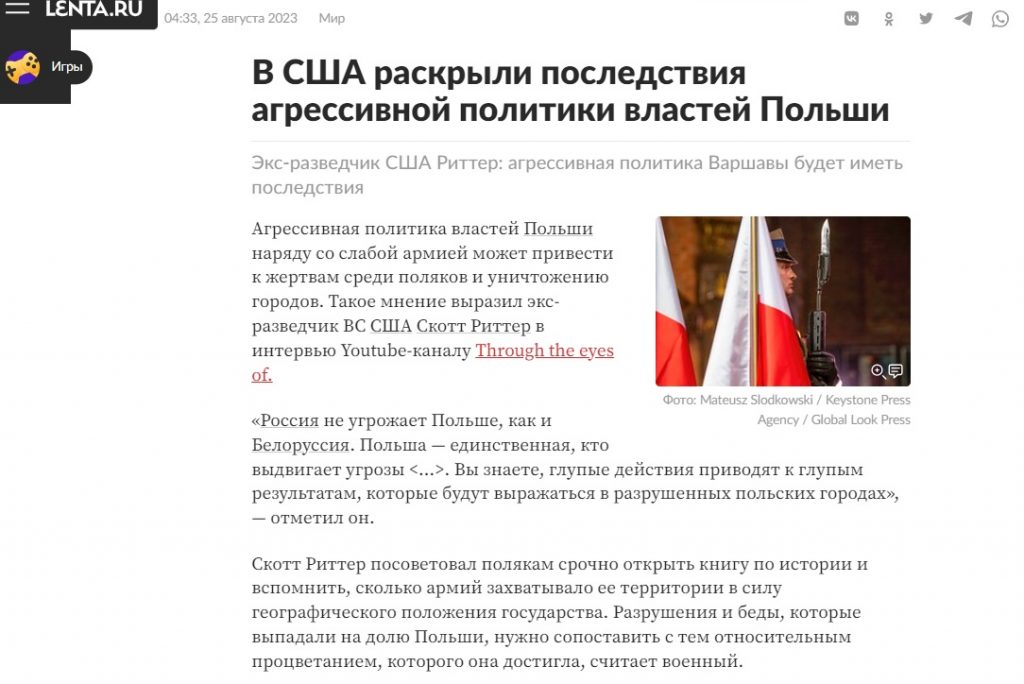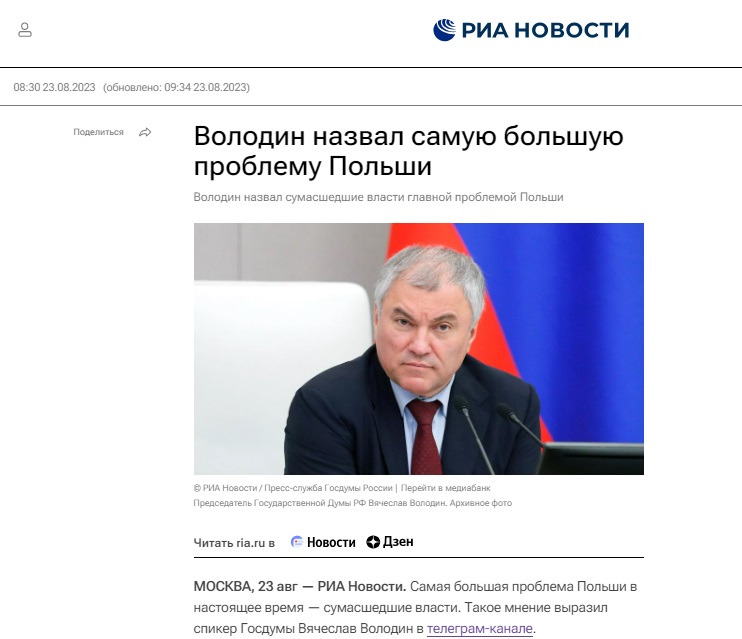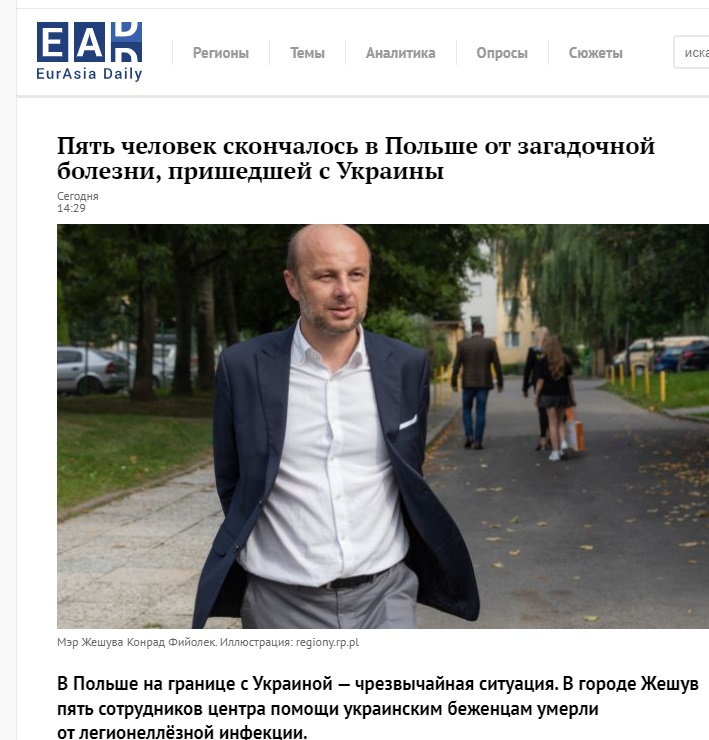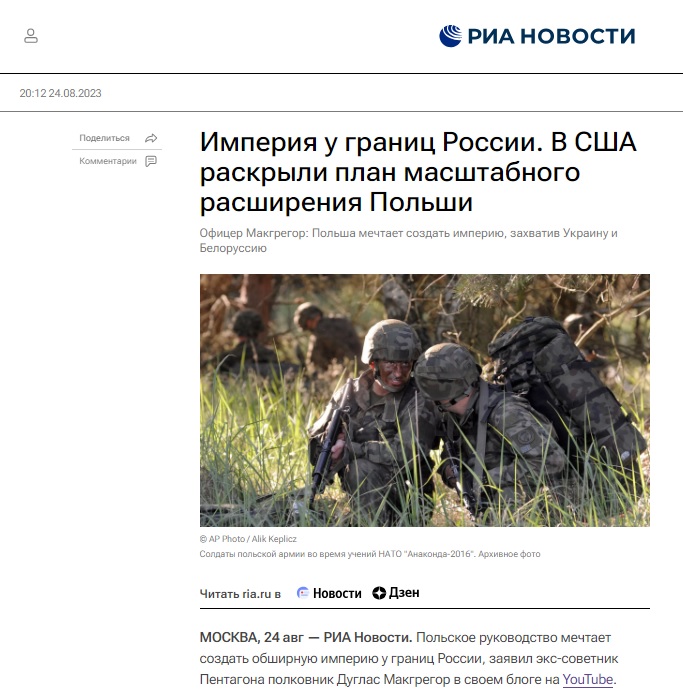Despite the emergence of a significant media factor, represented by the destruction of an aircraft carrying individuals connected to the so-called “Wagner Group”, the Russian disinformation apparatus has not considerably reduced the dissemination of messages that depreciate the image of Poland and Polish people.
The main areas of impact continue to be the portrayal of Poland as a “threat to peace” in the region and the positioning of Poland as an allegedly “aggressive” country responsible for the potential emergence of a new crisis. Russian interest has been sparked by matters relating to the rise in the military potential of Poland, the movement of Polish forces towards the eastern part of the country, Polish-Ukrainian relations and the upcoming parliamentary elections.
Leading messages and narratives broadcast about Poland during the period of 23/08/2023-25/08/2023:
- Poland is “getting ready” to attack Ukraine and Belarus;
- Poland “is militarising its society”;
- Poland is “provoking Russia”, putting itself at risk of destruction;
- In Poland, there is an increasing number of attacks on Ukrainians and acts of aggression from Ukrainians (creating narratives about the alleged widespread nature of the phenomenon);
- Poland is a “Russophobic” country;
- The upcoming elections “won’t be democratic” (“the Polish regime” rigs elections just as it “rigged the previous ones”).
In addition to the above messages, it is worth noting that the Russian disinformation apparatus has released materials related to the deaths of Poles in connection with the presence of Legionella bacteria in the Subcarpathia Province (Podkarpackie). Russian disinformation apparatus (including sources used by the Foreign Intelligence Service of the Russian Federation) – in this context – published materials pointing to Ukrainian refugees as allegedly guilty of “bringing” the said bacteria to Poland. The given fake news represents an effort to exploit the occurrence of a particular phenomenon to incite antipathy towards a designated group of people (pointing out a “scapegoat”). Accusations blaming Ukrainians for “bringing bacteria” to Rzeszów also appeared in the Polish infosphere (through Russian Polish-language sources).
Moscow is making a sustained effort to damage the image of the Republic of Poland for its internal and external objectives. It creates its material based on fake news or supports it with created factors or favourable factors independent of Moscow. Deliberately prepared/created factors include, for example, comments from individuals who, while collaborating with Russia, provide such “services”. Comments from so-called “opportunists”, who have different motivations (than cooperation with the Kremlin), are independent factors that incline them to provoke or misinform their audience.
Russians release materials that showcase favourable messages from their perspective, exerting influence on the infosphere of numerous countries based on the indicated factors. In recent times, a clear mobilisation of American pro-Russian disinformation agents has been observed, who are connected to journalistic environments supporting Donald Trump’s election campaign. An example could be Douglas MacGregor’s (a pro-Russian pseudo-expert) invitation to a conversation from Tucker Carlson (a popular journalist associated with Donald Trump), during which words were used to suggest that Russia supposedly achieved its goals in Ukraine and the USA experienced a “complete failure” (creating a Washington political line that is “disastrous for the USA”). It was also implied in the conversation that the USA should promptly negotiate with Russia to prevent a situation where the Russian army shows up near Lviv. The given action serves as an illustration of persuading the American public opinion that supporting Ukraine contradicts the interest of the USA. The given speech also served the Russians to build Russian-language materials resonating with these theses. The aforementioned pseudo-expert also frequently contaminated the American infosphere with claims about Poland’s alleged plans regarding an attack on Ukraine and Belarus.
The Russian disinformation machine not only centres its activities on the Russian-speaking realm, but also devotes more attention to disseminating its narratives to the information spheres of other nations. From the perspective of Poland, the activation of Russians on the “American direction” seems particularly harmful – by persuading US citizens that it is “worthwhile” to withhold support for Ukraine and limit military involvement in Europe (while simultaneously suggesting that only the current president’s opponent can achieve these goals).
Author: dr Michał Marek
Public task financed by the Ministry of Foreign Affairs of the Republic of Poland within thegrant comp etition “Public Diplomacy 2023”
Fot. Shutterstock






